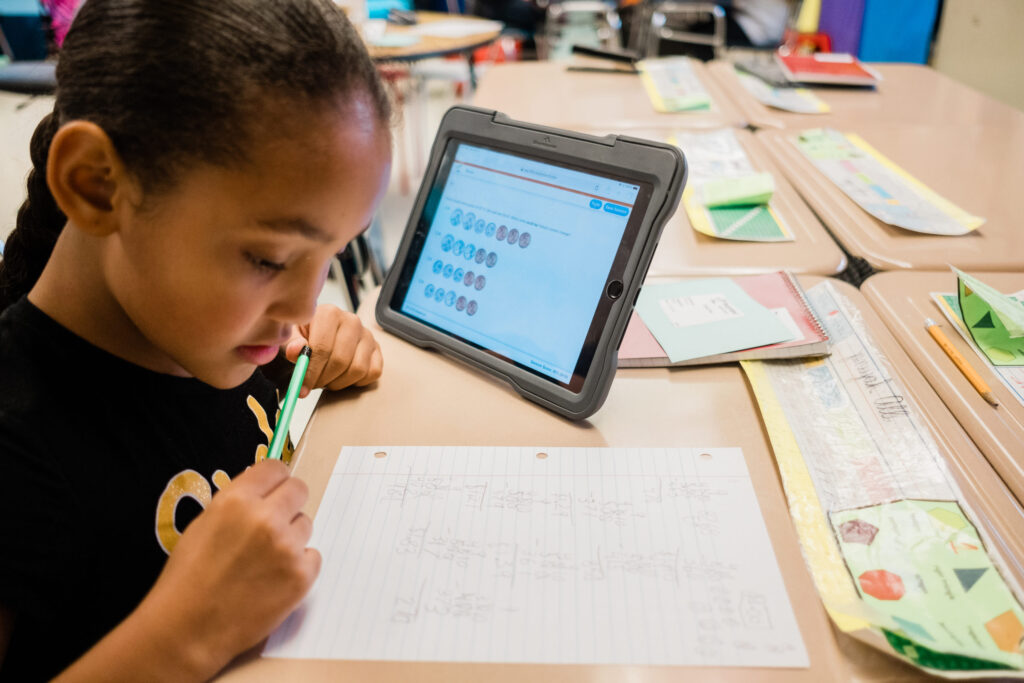Now more than ever, we know a one-size-fits-all approach won’t work when it comes to education. To build a more resilient and responsive system, both practitioners and policymakers must embrace new approaches that shake off decades-old standards and buck traditions.
This approach goes by many names: We refer to it as “personalized learning,” though others call it “student-centered” learning, and still others refer to it as “performance-based” learning.
These terms are often used interchangeably, to focus on different aspects of the same concept: A modern approach to learning that flips the traditional school model on its head.
Personalized learning (PL) puts each child at the center of their learning. Every student has a clear set of learning targets, and how they reach those targets is based on their individual needs and interests. They only move onto the next concept after they master the first, which helps eliminate learning gaps often created when students are whisked through a traditional, time-bound, grade-based system.
PL also reframes the very idea of success inside the classroom: No student is left waiting, and no one falls behind. Every child succeeds by meeting their targets at their pace.
Remake Learning’s new Personalized Learning Working Group focuses on building PL stakeholder knowledge and capacity, identifying key policy and practice changes that could expand PL throughout the region and pave the way to a stronger, more equitable system.
This month, we’ll be taking a closer look at the group and all things personalized learning, and we’re kicking things off with our top resources for understanding, practicing, and advocating for PL.
Something missing from this rundown? Email info@remakelearning.org to let us know!
RESOURCES FOR DEFINING PL
Competency-Based Education: Definitions and Difference Makers
Get familiar with a few different definitions of competency-based education and learn from some pioneers who are making a difference through constructivist, project-based approaches.
Standards-Based Grading as Explained by Cupcakes
This KnowledgeWorks article breaks down the difference between letter grading and a proficiency scale.
Teacher-Centered Versus Learner-Centered Learning
A guest blog post by Katie Varatta details the difference between a traditional classroom and a learner-centered environment.
What’s Possible with Personalized Learning? An Overview of Personalized Learning for Schools, Families & Communities
Why personalized learning matters and what it looks like in schools for teachers and students.
RESOURCES FOR PL PRACTICE
Finding Your Path: A Navigation Toolkit for Scaling Personalized, Competency-Based Learning
The new tool from KnowledgeWorks is designed to help learning communities understand the conditions for sustainable systems change and develop and advance a strategic plan for district-wide transformation to personalized, competency-based learning. It explores systems-level competencies, guiding questions, and plenty of examples!
Students at the Center Hub
Built around the Students at the Center Framework, this digital storehouse offers hundreds of student-centered learning resources and research, including this roundup focused on building student agency, self-advocacy, and self-direction.
Reinventing Schools For An Era Of Innovation
This article from Innovation Hub spotlights a North Dakota school district working to adopt a personalized learning initiative.
GripTape
A learning initiative that supports youth ages 14–19 in pursuing their learning passions. Through their signature Learning Challenge, youth can apply for financial help to support whatever learning endeavors they wish to pursue, all driven by their interests and definitions of success.
Personalized Learning²
A Pittsburgh-based project that combines personal mentoring and tutoring with an AI-powered app to personalize math lessons to the strengths and needs of students who otherwise would be underserved.
Personal Learner Profiles Build Student Agency, Teacher Capacity
Learn how one Minnesota district builds and uses learner profiles for all ages. For more on learner profiles, check out this guide to developing profiles from the New Zealand Ministry of Education and this sample profile from Indigo Assessment.
Khan Academy
Khan Academy offers a library of free, trusted, standards-aligned lessons covering math K-12 through early college, grammar, science, history, and more. Their additional tools can help teachers identify gaps in student understanding and tailor instruction.
Wizer
A digital worksheet builder that lets students demonstrate learning in multiple ways. It also offers teachers different options for creation and assessment.
Formative
A real-time assessment tool that gathers different student response types and has options for offering individualized feedback.
RESOURCES FOR PL POLICY
Learning From Crisis
In response to inequities exacerbated by COVID-19, the University of Pittsburgh’s Institute of Politics investigated the types of public policy, operational policy, and practices that enabled schools to respond rapidly with flexibility, demonstrate continuity in instruction, and maintain student engagement. This paper presents their findings and recommendations for both short-term changes and long-term opportunities.
Quality Principles for Competency-Based Education
This book presents 16 design principles to help states, districts, and schools reimagine the traditional education system. The framework will help stakeholders replace underlying beliefs and cultures with an inclusive approach and a competency-based learning system.
How Systems of Assessments Aligned with Competency-Based Education Can Support Equity
Competency-based education systems cannot meet their goals unless accompanied by high-quality assessments and assessment systems. This report details how a balanced assessment system can support competency-based education and what the system requirements might include.
BUILDING A PL COMMUNITY
Learner-Centered Education Map
A map from Education Reimagined that allows educators to discover, connect with, and visit learning environments, to explore different elements of learner-centered education. More are added each month!
Personalized Learning Network
A group of schools in southwestern Pennsylvania working together to tackle the unique challenges of implementing personalized learning.
Pitt’s Personalized Learning Focus and Network
Offering strategies for preparing students for lives of impact through educational experiences tailored to their specific goals and needs.
PittED Justice Collective
A three-year working group at the Pitt School of Education engaged in anti-racist, justice-directed initiatives with students, staff, faculty, alumni, families, youth, and district and community partners.
